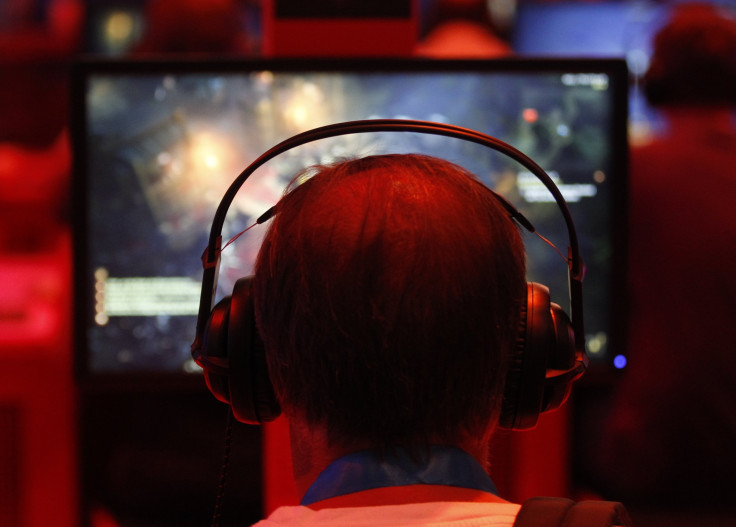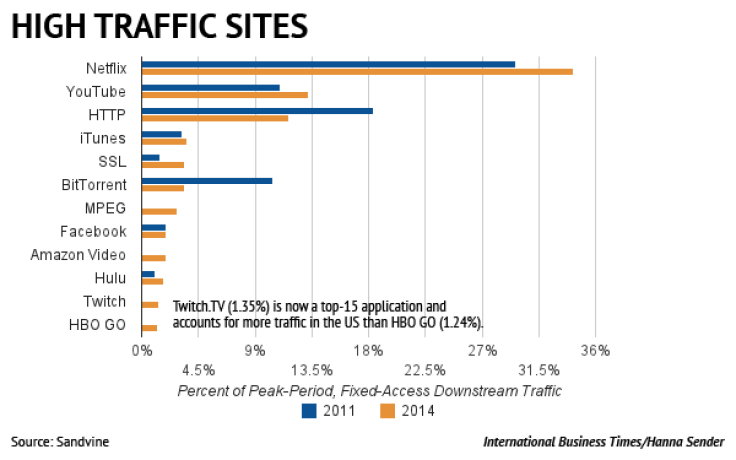Will Google Ruin Twitch? YouTube-Style Copyright Enforcement Worries Gamers Amid Rumors
Courts have not definitively weighed in on the legality of video-game streaming.

You may not yet have noticed Twitch.tv, but your Internet-service provider surely has. Since its launch just three years ago, the live video-game streaming company has eclipsed Hulu, Facebook, Amazon and even HBO Go in terms of bandwidth usage. Although it’s still far behind Netflix, it’s rapidly gaining -- and growing. Part networking site, part spectator sport, Twitch is a burgeoning phenomenon that allows video-game players to broadcast their games live, sometimes to thousands of viewers.
You read that right: One of the fastest growing websites on the planet is devoted to serving up footage of people playing video games, while allowing commentators to opine about what they are seeing. More than 45 million people now use the platform in any given month, a number that has more than doubled in less than two years. The sizable audience speaks to an old truth that for every person interested in an activity, two others will gladly watch.
To non-gamers, the idea of tuning in to watch other people play video games might seem akin to watching digital paint dry, but the phenomenon is no fringy subculture. According to a report released this week by IHS Technology, Internet users watched 2.4 billion hours of online video games (known as “e-sport videos”) in 2013 alone.
“E-sports videos have rapidly transformed from a niche activity into a widely watched, global, cross-platform entertainment category,” IHS research director Dan Cryan wrote on Monday.
Yet like so many Web innovations, Twitch has achieved critical mass and audience acclaim before the legality of its operation has been fully explored. The site could soon evolve from a popular community of gamers into a textbook case of copyright-enforcement pandemonium. Critical legal questions loom heavily over the platform: What is video-game streaming in the eyes of the law? Is it a retransmission of copyrighted material? A live broadcast of a sporting event? Or a hybrid of both?
The answer is, there is no answer -- at least not yet. The copyright implications of broadcasting and streaming video-games online remain largely untested, according to Mark Methenitis, a Dallas-based intellectual-property attorney who authors the blog Law of the Game. “At this point, it’s still sort of a Wild West in terms of definitive rulings from courts,” Methenitis told International Business Times in a phone interview. “Nobody really knows, because no court has weighed in.”
But they may soon have no choice: According to rumors, Google’s YouTube is looking to purchase Twitch for $1 billion -- a move that will put video-game streaming on the radar of those far beyond the gaming community. And that possibility is making some Twitch users nervous. “Well, there goes Twitch,” one Redditor wrote in response to the rumored courtship.
The rumors are so far unsubstantiated, based on a sprinkling of unnamed sources cited by Variety and the Wall Street Journal. Neither Google nor Twitch is commenting on the reports. But either way, the deal would align with the buy-first ethos of Google, one of the most acquisition-heavy companies in history. YouTube itself was a scrappy startup with an uncertain future before its astounding growth in a then-nascent arena -- online video -- caught the search giant’s attention. Google Inc. (NASDAQ:GOOGL) purchased YouTube in 2006, and it has succeeded in turning it into the undisputed online-video champ. But it has also been criticized for its perceived heavy-handed management approach, including a controversial move last year to integrate YouTube comments with its Google+ social network.
But it’s not a Google+ overhaul that most worries the Twitch faithful; it’s the possibility that, in the hands of Google, Twitch could be tainted by YouTube’s notoriously aggressive approach to copyright enforcement -- a policy that often results in videos being yanked from the site in the face of complaints from copyright owners.
Some game publishers have already embraced streaming to some extent. For instance, Microsoft Games, Blizzard Entertainment, and several others have enacted user agreements that explicitly allow for the live streaming of their titles. But such agreements often don’t extend to commercial use, and that could spell trouble under Twitch’s revenue model, in which gamers are paid a percentage from advertisements that run against their streams. YouTube uses a similar model.
Perhaps more problematic is the question of music. Some game players stream live games along with their original background music; others prefer to stream to a soundtrack provided via Pandora or another music-streaming service. Either scenario, Methenitis said, could potentially provoke the ire of music publishers. “A lot of times, even within the game itself, the music may be owned by a different entity than the game publisher,” said Methenitis, citing games like “Grand Theft Auto: Vice City,” which uses an assortment of peppy ‘80s hits to tell its story. “That could create a dual copy issue.”
The music industry, at least for now, is staying cautiously mum. A spokeswoman for the Recording Industry Association of America declined to comment on the copyright implications of video-game streaming, telling IBTimes in an email that the trade organization is still looking into the issue.

Meanwhile, the rise of Twitch will only continue. As an industry, video games make more money than Hollywood movies and pop music combined, and third-party viewing is to some extent a natural progression of what is, by any definition, the national pastime of the 21st century. Twitch Interactive Inc., a company formed from the online-video site Justin.tv., recognized this trend early on -- in 2007 -- when video streaming was still in its infancy. Today the company uses up about 1.35 percent of the Internet’s peak-period bandwidth in North America, more than HBO GO, according to a recent report by Sandvine. A Deep Field Study, released in February and cited by the Wall Street Journal, said Twitch accounted for 1.8 percent of peak Internet traffic in the U.S., surpassing Facebook, Hulu and even Amazon.
All that said, selling to Google would no doubt make sense. In a lot of ways, Twitch is a victim of its own success, plagued by glitches and lag-time issues as it has tried to keep up with ever-growing demand for bandwidth. Google, conventional wisdom suggests, could provide the infrastructure Twitch sorely needs.
Methenitis said the search giant could provide Twitch with something even more valuable: a strong legal ally for that inevitable day when video-game streaming collides with the murky recesses of U.S. copyright law. “Google has never really been one to shy away from a legal fight,” he said. “I think they have the money and the lawyers to be able to take this as far as they possibly can.”
Got a news tip? Email me. Follow me on Twitter @christopherzara.
© Copyright IBTimes 2024. All rights reserved.












